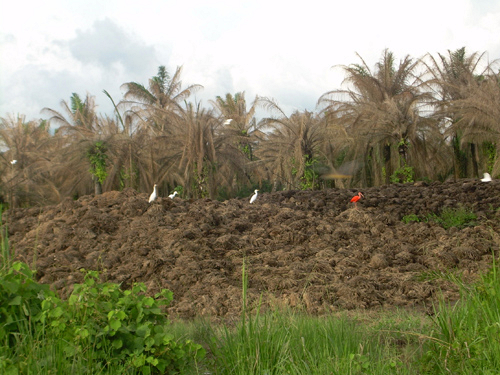 |
| Oil palm wastes |
20/04/2011 (The Star) - Much of the 70 million tonnes of oil palm biomass produced annually is burnt or left to rot.
This waste pollutes rivers through seepage and harms the environment when it produces methane and carbon dioxide.
The Government has realised that oil palm biomass can be as valuable as crude palm oil and has come out with the Oil Palm Biomass Roadmap that will streamline efforts to convert this waste into wealth-generating industries.
Unik, an agency under the Prime Minister's Department to promote innovation, will undertake this project.
The agency will be collaborating with Dutch consortium BE-Basic to develop Malaysia's capabilities in using renewable resources for the production of chemicals, materials, products and fuels.
According to BE-Basic director Prof Dr Luuk van der Wielen, oil palm biomass would be able to contribute to the economy by as much as 5% if its use is widened to produce liquid biofuels and biochemicals.
“There's no technical barrier any more, it's a matter of making Malaysia attractive for companies to invest in this sector here, a matter of making connections to the plantation sector here,” he said in a recent report.
This development has also attracted foreign chemical companies which have invested by establishing demo-facilities in Malaysia.
Oil palm biomass can be converted into high-value chemicals such as ethanol and even higher value acids such as lactic acid, which is used in a wide range of food applications as well as the cosmetics industry and numerous biochemical processes.
It is also used as a monomer for producing polylactic acid, which has applications in biodegradable plastic.
Dr van der Wielen, who is also a professor at the department of biotechnology at Delft University of Technology, has been working with Universiti Teknologi Malaysia since 2009 to develop sustainable solutions for the chemical and fuel industry.
The Netherlands is the biggest consumer of palm oil in Europe.
The country is also currently the ninth largest export destination for Malaysia and third in the European Union.
Sustainable Solutions
13/04/2011 (Daily Mail) - The drive for ‘eco-friendly’ biofuels has backfired and may be contributing to climate change, says a report.
Plant-based fuels have pushed up food prices, increased deforestation and threatened endangered animals, the Nuffield Council on Bioethics found.
The think-tank said their spread has led to ‘near slavery conditions’ on sugar plantations in the developing world and may have increased greenhouse gas emissions.
Unexpected: A recent report shows the speedy introduction of biofuels has been a disaster
Its report branded the UK’s biofuel policies ‘unethical’ and called for guidelines to ensure future ‘green’ fuels do more good than harm.
Most green biofuels come from maize, sugarcane, palm oil and rapeseed oil. By law, at least 5 per cent of petrol and diesel sold on British forecourts must be biofuel by 2013 compared with 3 per cent now.
Switching to biofuels was supposed to reduce carbon dioxide emissions from burning fossil fuels and prevent man-made climate change.
But the report shows their speedy introduction has been a disaster. Clearing rainforests for biofuel crops in Brazil, Malaysia and Indonesia has forced people off their land and threatened orangutans.
Ploughing has released carbon dioxide that would otherwise have been locked away in the soil.
In the U.S., turning farmland over to maize for fuel has cut supply of other crops and raised food prices.
'Eco-friendly' Biofuels
15/04/2011 (City Journal) - We're less than 50 years from the end of world oil supplies at current consumption rates according to a new report by HSBC bank. That coming shortage has brought new calls for increased reliance on biofuels, including from President Obama in last month's energy speech. Biofuels are made from crops like corn, sugar, palm oil and cassava root which are harvested and then shipped to plants to be converted into fuels like ethanol.

While it's likely that biofuels will play a significant role in powering more efficient vehicles in the US and China, the poor nations that rely on these crops for food are facing rising rates of hunger and poverty as a result. Research by the World Bank found that an increase in biofuels production over 2004 levels would push more than 35mn additional people into absolute poverty, or an income of less than $1.25 per day. An analysis in the spring 2011 issue of The Journal of the Association of American Physicians and Surgeons, meanwhile, used statistics from the World Health Organisation (WHO) to estimate that our growing need for biofuels will result in at least 192,000 excess deaths from hunger and poverty every year. This is higher than the 141,000 deaths the WHO estimates to be caused by global warming each year.
The United Nations Food and Agriculture Organisation reports that 2011 has the highest food prices yet recorded. Despite the price of corn rising 73% in the US late last year, in part due to 40% of the crop now being used to make biofuel, Americans will probably only see a 2-3% increase in food prices in 2011. "For Americans it may mean a few extra cents for a box of cereal," said Marie Brill, senior policy analyst at ActionAid, an international development group. "But that kind of increase puts corn out of the range for impoverished people."
Though this year's skyrocketing food prices can also be attributed to high oil prices and severe weather events destroying crops in Russia and Australia, the market for biofuels also bears some responsibility. "What is certain is that biofuels are playing a role," said Oliver Dubois, a bioenergy expert at the Food and Agriculture Organisation in Rome.
This is especially true since many industrialised countries are aiming a transition from reliance on fossil fuels to greater use of biofuels.
Biofuels
14/04/2011 (The Guardian) - The legal requirement to put biofuels in petrol and diesel sold in the UK and Europe is unethical because their production violates human rights and damages the environment, a major new inquiry has concluded.
"Biofuels are one of the only renewable alternatives we have for transport fuels, but current policies and targets that encourage their uptake have backfired badly," said Prof Joyce Tait, at Edinburgh University, who chaired the 18-month inquiry by the independent Nuffield Council on Bioethics (NCB). "The rapid expansion of biofuels production in the developing world has led to problems such as deforestation and the displacement of indigenous people."
The need to meet rising biofuel targets has also led to exploitation of workers, the loss of wildlife and higher food prices, the inquiry found. Under the European Union's renewable energy directive, 10% of transport fuel must come from renewable sources such as biofuel by 2020. Alena Buyx, assistant director at the NCB, said: "If you look at food prices and they go up and incomes do not, then more people will probably die from hunger, and biofuels are one contributing factor to those price rises." Biofuels also contribute to poor harvests, commodity speculation and high oil prices which raise the cost of fertilisers and transport, she added.
"But doing nothing is also immoral," said Prof Ottoline Leyserof Cambridge University, and another member of the NBC working party. There is a clear need to replace liquid fossil fuels to limit climate change and if a new biofuel technology meets ethical conditions, there is a duty to develop it, she said.
The main transport biofuels that are currently used – bioethanol, made from maize and sugar cane, and biodiesel, made from palm and rape seed oil – both come from food crops and can have substantial ethical problems, the inquiry concluded.
But future generations of biofuel, made from agricultural waste such as straw, fast-growing perennials such as willow or miscanthus grass, or even algae grown in tanks, could avoid many of the problems by not competing directly with food. "These are very exciting technologies," said Leyser. "The potential is huge."
In the UK, 5% of transport fuel must come from renewable sources by 2013. Today, 3% of the UK's petrol and diesel comes from biofuel, mostly produced in Argentina, Brazil and other European countries. But in January, it was revealed that two-thirds of the biofuel being used in the UK today failed to meet environmental standards. Government cuts to the budget of the Carbon Trust also saw a flagship algal biofuels project cancelled.
The Department of Transport is currently consulting on changes to the UK's biofuels regulations. Transport minister Norman Baker said: "It has already been agreed that no biofuel will count towards European renewable energy targets unless it meets certain sustainability requirements. But we are pushing the European commission to go further. Be in no doubt, we consider the sustainability of biofuels to be paramount."
An international certification scheme, like the Fairtrade scheme for food, must be introduced, the NCB inquiry concluded. It would guarantee that the production of biofuels met the five ethical conditions identified by the NCB: observing human rights, environmentally sustainable, reduced carbon emissions, fairly traded and equitably distributed cost and benefits.
Targets for biofuels had driven a rapid expansion, in parts of the world with lower ethical standards, the researchers said. They cited the destruction of rainforest in Malaysia to produce palm oil, forcing people off their land and endangering orangutans, and a 2008 report by Amnesty International which found conditions near slavery for workers in some sugarcane plantations.
"We should slow down [the targets] if it is not possible to meet ethical standards," said Buyx. "But we think it is possible to do that [meet such standards] if enough pressure is applied." The inquiry found positive examples too, such as small-scale biofuels initiatives that provide energy, income and livelihoods in fuel-poor areas, such as in rural Mali.
Existing certification schemes, such as that run by the Roundtable on Sustainable Biofuels were a good start, the researchers said, but remained entirely voluntary. There was also problem of responsible biofuel producers having to conform to many different standards. At present, said Buyx: "the EU says each member country should make their own voluntary scheme - that is madness."
Tait added: "An international certification scheme will not add to red tape, it will simplify it with one overarching standar
d."
Roundtable on Sustainable Biofuels






































































